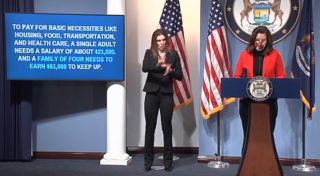Based on a new report released today by the Michigan Poverty Task Force, Gov. Gretchen Whitmer says that lifting millions of Michigan residents out of poverty will require bold new initiatives, expanded state policies and a significant financial investment.
The task force presented its findings – a list of 35 policy recommendations – to the governor, who created the task force back in December of 2019 to identify new ways that state government can help low-income Michigan residents transcend poverty and build a better life.
She said in her press conference today, “The economic impact and hardships this pandemic has imposed on so many Michiganders only makes the work of this task force more critical,” and adds, “These recommendations will help us ensure that Michigan families have access to the support they need. I look forward to working across the aisle and with our many stakeholders to implement the recommendations that have the biggest impact across our state.”
To further the Task Forces efforts and recommendations, Gov. Whitmer included a $1-M appropriation to conduct research and planning that will help lead the way towards improving the effectiveness of state benefit programs and address the barriers limiting individuals’ ability to access these programs in her Fiscal Year 2022 budget recommendations.
The task force, led by the Michigan Department of Labor and Economic Opportunity (LEO), consists of leaders from 14 state departments, with input from the Legislature and philanthropy and community organizations who worked together throughout the COVID-19 pandemic to develop a comprehensive anti-poverty agenda for Michigan.
Susan Corbin, LEO acting director says, “The task force’s approach to poverty eradication will not only lift the poorest Michiganders but will also help those who’ve seen their middle-class status slip away because of stagnant wages and an evolving job market.”
You can read the full task force report at this link:
LEO-Poverty_Task_Force_Report_716585_7
While many state government efforts are already in place to help Michigan’s poor, the Poverty Task Force offered 35 new policy recommendations organized in five main areas. Examples of the report’s recommendations include:
- Benefits: Commission a comprehensive study on outcomes for former state assistance recipients and adopt a Temporary Assistance for Needy Families shelter stipend
- Economics: Increase access to Michigan’s Earned Income Tax Credit; support and incubate children’s savings accounts; and expand the housing choice voucher pilot program between the Michigan State Housing and Development Authority and the Michigan Department of Corrections
- Criminal Justice: Expand apprenticeship opportunities for inmates while incarcerated; and divert people with behavioral health needs away from the justice system
- Health, Safety and Housing: Create child support pass-through to families who receive or have received cash assistance; and fund the Michigan Housing and Community Development Fund
- Education: Expand the Great Start Readiness Program; expand Early Childhood Home Visiting and Maternal-Infant Health programs; increase income eligibility for child care; and expand school breakfast and breakfast-after-the-bell programs
Kim Trent, LEO Deputy Director for Prosperity and a key staffer to the Poverty Task Force, says, “These recommendations are the first step toward restoring the state’s safety net and bringing opportunity to struggling families,” and adds, “Creating conditions that give every Michigander access to economic opportunity and prosperity is one of the most sacred duties of state government.”
Today, 43-percent of Michigan residents earn less than the basic cost of living and 1-in-5 children live in poverty, according to the United Way’s ALICE (Asset Limited, Income Constrained, Employed) report. To afford the basics, single adults need a salary of just over $21,000 and a family of four needs to earn over $61,000.
Mike Larson, President and CEO of the Michigan Association of United Ways, says, “The Michigan Association of United Ways commends the efforts of Governor Whitmer and the Michigan Poverty Task Force to undergo the critical work of better serving Michigan’s most vulnerable residents,” adding, “We know that low wages, reduced work hours and depleted savings, combined with increased costs of living, have made for an uneven economic recovery in Michigan. In looking at real, measurable data identifying those who struggle to afford basic needs, we can better visualize ways to collaborate, shine a light and ultimately reduce the ALICE population—and the Poverty Task Force has set out to do just that.”
Lori Johnson, project director at the EightCAP Inc. Community Action Agency in Greenville and a member of the Michigan Poverty Task Force Advisory Council, said the task force has identified solutions to address poverty in all corners of the state, noting, “The comprehensive way the task force has approached issues will have a tremendous impact across Michigan, in communities large and small, urban and rural.”
Michigan League for Public Policy President and CEO Gilda Jacobs said the Michigan Poverty Task Force report is a starting point for further discussion and planning, and adds, “We hope the recommendations will help the state better leverage existing resources, create pathways to new resources and build partnerships with external stakeholders to better serve struggling Michiganders.”
Rev. Charles Williams II, Senior Pastor at Historic King Solomon Baptist Church and Michigan Chair for the National Action Network, added his support for the Task Force recommendations and their power to stem the tide of poverty, saying, “Pastoring in a city with one of the largest poverty margins in the country, means I’ve seen what it does to individuals and communities firsthand. Although poverty has had a presence in society for quite some time, it doesn’t mean we should ever stop working on it. The Governor’s plan takes quality steps towards stemming the tide of poverty and increasing mobility for those who are stuck at the bottom.”
Gretchen Wagner, Bay-Arenac ISD early childhood education director says, “The policy recommendations from the Poverty Task Force are an important first step in assisting residents in the State of Michigan and I appreciate the fact that the ALICE population are considered in this work. From an early childhood perspective, these steps are necessary to continue to the work that has begun in this state and will continue to help our youngest residents and their families. Additionally, from a trauma perspective, these are the beginnings of a solid foundation to begin to address the trauma and build resilience in people across the state.”
Luke Forrest, Community Economic Development Association of Michigan Executive Director commented on the Task Force report, saying, “As I talked to community leaders and legislators across the state in 2020, I repeatedly heard about the need for more housing resources. The Housing and Community Development Fund is a proven solution that simply needs a dedicated funding source. When funded, it has leveraged each state dollar into $11 of additional investment, creating jobs and homes for those in need.”
More information on the Poverty Task Force is available online at: http://Michigan.gov/LEO.






